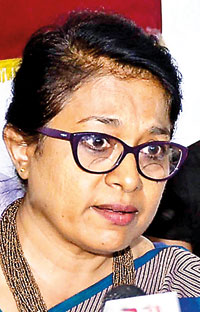News
Human Rights Commission warns against harassment of Muslims
The Human Rights Commission of Sri Lanka (HRCSL) is receiving complaints from Muslims about widespread harassment tied to “cultural misunderstandings, stereotyping and insensitivities to a way of life,” said Deepika Udagama, its Chairperson, this week.
The whole Muslim community was being branded for acts of terrorism perpetrated by a few amongst them, Dr Udagama said, adding that the harassment was mainly around the dress of women.
 On April 29, the President, under the Public Security Ordinance, gazetted regulations prohibiting wearing “any garment, clothing or such other material concealing the full face which will in any manner cause any hindrance to the identification of a person” in public. “Full face” was defined as “the whole face of a person including the ears”. The niqab and the burka fall within this scope.
On April 29, the President, under the Public Security Ordinance, gazetted regulations prohibiting wearing “any garment, clothing or such other material concealing the full face which will in any manner cause any hindrance to the identification of a person” in public. “Full face” was defined as “the whole face of a person including the ears”. The niqab and the burka fall within this scope.
“We hope that full face helmets also come within the ambit of this emergency regulation,” Dr Udagama said. “We don’t see a problem with that, because during a period of heightened security concerns, people ought to be able to establish identity and the authorities need to be able to get that done quickly, without hindrance.”
But according to complaints lodged at the HRCSL, even women visiting hospitals in hijab (head covering) are told they cannot enter, she said. “There is a general sense of unease around women.” There are also reports of private taxi companies cancelling rides when the customer has a Muslim name and other incidents in workplaces.
“We hope schools would not have instances of this type of insensitivity and intolerance,” she continued. The Commission wrote to the Ministry of Education commending them for coming up with security measures for schools.
“But we pointed out that it is, first and foremost, very important to explain to the entire school community the objective of security is to protect everybody, not to harass individuals of a particular group, or stereotype, or engage in these security activities in a manner to humiliate a particular community,” she said.
The Commission welcomed that there has been no major reprisal against the Muslim community after the Easter Sunday bombings, such as was witnessed in Aluthgama or Digana in the past. There was one major incident reported from Negombo this week. Besides this, it was, Dr Udagama said, “a major achievement”. But treating all Muslims as terrorists was “a sure-fire way” to cause further radicalisation, particularly among young people.
“We must, as a society, recognise that it is very damaging because the Commission has seen how the Muslim community themselves felt quite victimised by this act of terror although the majority had nothing to do with it,” Dr Udagama said. “They knew there could be reprisals, that there would be a price to pay. They’re also suffering. They’re also going through a difficult time. They have also risen to the occasion, assisting authorities with the investigations openly.”
After the bombings of April 21, the HRCSL’s main concern was ensuring there won’t be retaliation and reprisal. Apart from a public appeal, it wrote to the Inspector General of Police (IGP) to ensure prevention of violence.
“And we have to look at it very positively that, thus far, there have been only a few incidents,” Dr Udagama said. “When we monitored detainees through our routine visits to police stations, the police were open with us. There have not been any serious allegations of torture or ill treatment. And no disappearances or abductions recorded or complained of. Thus far, there have only been two cases of torture complaints relating to this incident.”
Many of the arrests were made through assistance of the Muslim community, the HRCSL Chairperson pointed out. “We also find that the Muslim community is having a healthy debate about the onset of Wahabism, what it has entailed and what it has done to the Sri Lankan Muslim community,” she said. “Those are positive trends.”
In the past, whatever discomfort was felt within the Muslim community, and even among other communities, in response to the onset of Wahabism and fundamentalism, it was kept under wraps, she observed. “There was no open discussion, there were murmurs,” she said. But now, it has come into the open and these discussions and debates are taking place in quite a healthy manner. These are all positive things.”
“I think we should look at these positive sides of an extremely tragic incident,” she asserted. “People are reflecting and there’s introspection. Therefore, these acts of discrimination, of humiliation and of cultural insensitivity are counterproductive.”
The larger community must assist the Muslims to go through a difficult period with dignity, she said. This week, the Commission met with a large number of civil society representatives who recognised the positive trends but expressed concern about cultural insensitivities and the branding of all Muslims as “terrorists”. “The commission recognises that as major concern, and, as a society, we must address it,” she asserted.
Radicalisation was not unique to one community, Dr Udagama pointed out. The Sinhalese have often been labelled, not only domestically but internationally, as being “a very violent lot – which is not true”. The Tamils were branded during the war. Now, there is a tendency to look at Muslims with suspicion.
“We must be empathetic and move forward in a positive way,” she said.

